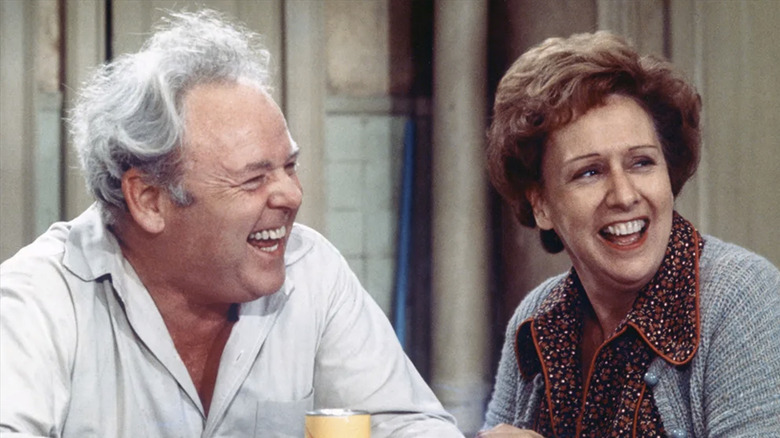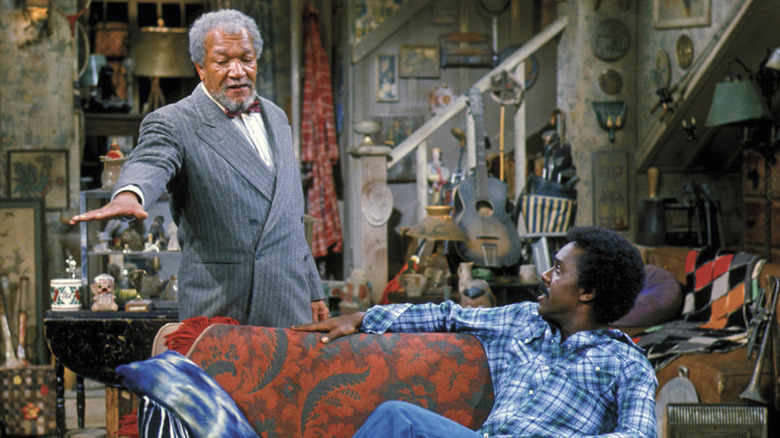Two Of The Most Important '70s Sitcoms Were Remakes Of British Television Shows
There are no shortage of American TV shows that are quietly based on British TV shows from years earlier. Before Steve Carrell led "The Office" in the US., Ricky Gervais led "The Office" in the UK. Before Emmy Rossum starred as Fiona Gallagher in America's "Shameless," Anne-Marie Duff was playing Fiona in the original British version. Whenever a hit new American show comes out, you should always look around for a grittier, lower-budget British version. There's a good chance you'll find one.
This trend isn't new. Back in the '70s, there were two major American sitcoms that were also based off British shows: "Sanford and Son" and "All In the Family." The former was based off the show "Steptoe and Son," which premiered in '62 and continued into '74. Both shows feature the same basic dynamic of an elderly cranky bigot paired up with a more open-minded son, but the British version was grimier. The elderly Steptoe was more frail than the elderly Samson, and Samson had more of a fun con-artist edge to him.
"All in the Family," meanwhile, was based on the '65 sitcom "Till Death Us Do Part." Like "Sanford/Steptoe," both versions focused on a prejudiced working class man constantly clashing with characters from a more progressive younger generation. In "Till Death Us Do Part," the main couple, Alf and Elsie, were more insulting towards each other than their American equivalents of Archie and Edith. Archie and Edith's house was also larger and less cluttered, and Archie's prejudices were generally softened. It seems like with every American version of a British TV show, the American show is a little warmer and sappier, while the British show has some real teeth to it.
British '60s pop culture cast a large shadow
Both of these American adaptations were created by the same duo, Bud Yorkin and Norman Lear. By the time "Sanford and Son" premiered, "All in the Family" was already a hit and critics were pointing to Yorkin and Lear's involvement as a reason for viewers to check out this new show.
The success of both adaptations spurred American TV critics to muse about the sheer amount of influence the British wielded on American culture. Not only had the Beatles dominated the music scene throughout the '60s, but now all these '60s British shows were providing the blueprints for two of the most popular American sitcoms of the new decade.
"American television viewers are deeply in debt to the creative minds of British video," wrote critic Rick Du Brow for a Massachusetts paper, "For it is the British who have provided either the ideas or the actual programs for some of the most worthwhile popular and cultural shows on television in America. A cynic might say that the United States make bad video programs better than the English, but that the British make good shows better than we do, in general."
Fifty years later, it's looking like the trend might reverse. In 2021 the British pay-TV operator Sky announced it'd be making its own version of "Saturday Night Live," and after a few years of production hell it seems like the show will finally premiere in 2026. For once it's the Brits copying the Americans, though that's not necessarily a bad thing for the British. Much like how America's "The Office" arguably improved on its cold British counterpart, it's possible the British "SNL" might have more of a spark to it than modern American "SNL."

